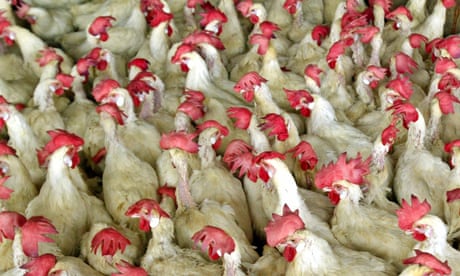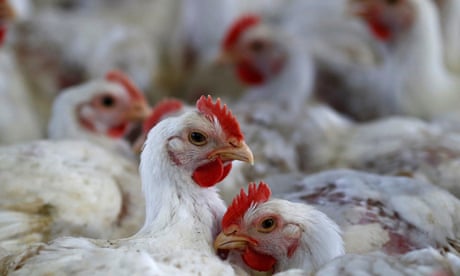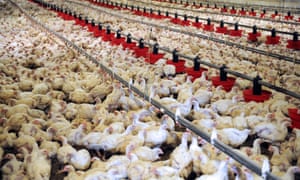Futures Forum: Brexit: and Fox eating chlorinated chicken
The US Trade Secretary on a visit to the UK has brought up the subject again:
Wilbur Ross, the US commerce secretary, said that a trade deal with Britain could be signed within months of Brexit, brushing aside claims that it could take 10 years for an agreement to be reached.
But Mr Ross said there would be problems if the UK retained the current EU-wide bans on chlorinated chicken and genetically-modified food.
Speaking at the Confederation of British Industry (CBI) conference, Mr Ross said his trip to the UK allowed him to “address with the UK some concerns we have that they may be tempted to include (provisions) in their agreement with the European Commission (EC) that could be problems for a subsequent FTA (Free Trade Agreement) with the US".
Don't let the EU dictate Brexit if you want a speedy US trade deal, Trump adviser warns UK - Telegraph
Or as the Sun would have it:
GAME OF CHICKEN
Donald Trump’s commerce secretary urges Britain to ditch EU ban on chicken washed in chlorine
 Wilbur Ross says getting rid of the unnecessary regulations would help speed up a free-trade deal with the US
Wilbur Ross says getting rid of the unnecessary regulations would help speed up a free-trade deal with the US
By Matt Dathan, Political Correspondent
7th November 2017
DONALD Trump’s commerce secretary has urged Britain to ditch EU rules banning chicken washed in chlorine to fast-track a US trade deal. Wilbur Ross said food regulations are among several “landmines” that could obstruct negotiations with America.
He urged Britain’s Brexit negotiators not to give in to the EU’s “highly protectionist” trade approach.
The US allows the sale of chicken washed in chlorine. The EU does not.
Other Brussels regulations, such as GM crops food standards, should also be binned if Britain wants a swift trade deal with the US, he said on the last day of his five-day visit to the UK. He claimed restrictions imposed by the EU were “really not science-based”.
Donald Trump’s commerce secretary urges Britain to ditch EU ban on chicken washed in chlorine
Or as George Monbiot in the Guardian would have it:
Chlorinated chicken? Yes, we really can have too much trade
George Monbiot
Britain should not be forced to accept lower US food standards. But this is only a small part of the harm done by globalisation
7th November 2017
DONALD Trump’s commerce secretary has urged Britain to ditch EU rules banning chicken washed in chlorine to fast-track a US trade deal. Wilbur Ross said food regulations are among several “landmines” that could obstruct negotiations with America.
He urged Britain’s Brexit negotiators not to give in to the EU’s “highly protectionist” trade approach.
The US allows the sale of chicken washed in chlorine. The EU does not.
Other Brussels regulations, such as GM crops food standards, should also be binned if Britain wants a swift trade deal with the US, he said on the last day of his five-day visit to the UK. He claimed restrictions imposed by the EU were “really not science-based”.
Donald Trump’s commerce secretary urges Britain to ditch EU ban on chicken washed in chlorine
Or as George Monbiot in the Guardian would have it:
Chlorinated chicken? Yes, we really can have too much trade
George Monbiot
Britain should not be forced to accept lower US food standards. But this is only a small part of the harm done by globalisation
‘Chlorine-washed chicken could be the least offensive of the US meat regulations a trade deal might force us to adopt.’ Photograph: Fred Tanneau/AFP/Getty Images
Comments 2,636
Tuesday 25 July 2017
What’s wrong with chlorinated chicken? It’s not as if chlorine is absent from our lives: we drink it in our tapwater every day. Surely it’s a small price to pay for the trade deal with the US that the British government seeks?
There are several answers to this question, ranging from the instrumental to the existential. Let’s begin with the immediacies. Washing chicken carcasses with chlorine allows farmers and processors to save the money they might have spent on systemic sanitation throughout the chicken’s life and death. You need only dunk the meat in a chlorine bath to kill any accumulated germs.
Does it work?
It is true to say that rates of foodborne illness are similar between the EU and North America. Remarkably, however, chlorine-washed chicken could be the least offensive of the US meat regulations a trade deal might force us to adopt. It has been pushed to the fore because it is less politically toxic than the issues hiding behind it. The European Union rules, which currently prevail in the UK, take a precautionary approach to food regulation, permitting only products and processes proved to be safe. In contrast, the US government uses a providential approach, permitting anything not yet proved to be dangerous. By limiting the budgets and powers of its regulators, it ensures that proof of danger is difficult to establish.
An investigation by Reuters discovered that chicken companies in the US use a wide array of antibiotics as routine feed supplements to prevent disease and promote growth. One belongs to a class of antibiotics listed by the US Food and Drug Administration as “critically important” in human medicine. They are administered to the chickens in low doses, creating perfect conditions for the emergence of new, antibiotic-resistant superbugs.
Further reports reveal that chickens are dosed with antihistamines, to make their meat more tender. Some carcasses have tested positive for residues of steroids and ketamine. There is evidence that a hormone injected into US cattle to fatten them more quickly may increase the risk of breast cancer. And all this is before Trump completes his assault on the US regulatory system.
Trade agreements today have little to do with reducing tariffs, many of which have already been eliminated. Now they have two principal functions. The first is to extend intellectual property rights that tend to raise prices and help the biggest corporations eliminate smaller competitors. The second is to “harmonise” regulations. When you have an asymmetric deal – between a very large country with low standards and a smaller one with higher standards – there is going to be only one outcome. We will end up with US standards.
But there are still bigger issues in this game of chicken. The Guardian recently published an article by Colin Cram, arguing that the UK is not engaging sufficiently in China’s Belt and Road programme – a series of vast infrastructure schemes the Chinese government is funding to facilitate its exports (Manchester’s Airport City is one component). The UK, Cram claimed, “must” become a full participant in this programme, “massively revitalising its infrastructure so that all parts of the country, not just the south-east, can engage with these huge markets”. Do we suffer from a deficit of air pollution, noise, climate change and plastic waste? We must accelerate the Gadarene rush over the environmental cliff.
A study published by researchers at the London School of Economics last year discovered that the regions that voted most strongly for Brexit were those that had been hit hardest by “the Chinese import shock”. Anger towards immigration, they argue, became a proxy for the loss of manufacturing jobs and incomes: many of the strongest leave votes were in places with the least immigration. Their data suggests that Brexit was globalisation’s blowback. But our government wants to seize this opportunity to accelerate the process. So much for taking back control.

Media is 'obsessed' with chlorine-washed chicken, says Liam Fox
So the existential question the chicken issue raises is this: why do we want more trade? What is it for? The old promise was that trade led to prosperity. But what if we have enough already? What if enhanced global trade, far from promoting wellbeing, now undermines it?
To trade fundamentalists, rainforests and ancient woodlands, coral reefs and wild rivers, local markets and lively communities, civic life and public space are nothing but unrealised opportunities for development. Where we see the presence of beauty, tranquillity and wonder, they see the absence of palm oil plantations and soybean deserts, container ports and mega-dams, shopping malls and 12-lane highways. For them, there is no point of arrival, just an endless escalation of transit.

Brussels attacks Liam Fox's 'ignorant' remarks on chlorinated chicken
Nowhere is a place in its own right; everywhere is a resource waiting to be exploited. No one is a person in their own right; everyone is a worker, consumer or debtor whose potential for profit generation has yet to be realised. Satiety, wellbeing, peace: these are antithetical to globalised growth, which demands constant erasure and replacement. If you are happy, you are an impediment to trade. Your self-possession must be extinguished.
So this is where the chickens come home to roost. Enhanced global trade now threatens our health, our sovereignty, our democracy. Once it made us rich. Today it impoverishes us.
• This article was amended on 28 July 2017. An earlier version said the Adam Smith Institute’s claim in a recent report that the rates of salmonella infection in North America were “not out of line” with rates in the European Union was false. This failed to take into account an item marked Non-typhoidal S. enterica in the World Health Organisation report cited by the ASI referred to a Salmonella species, and the assertion that the ASI’s claim was false has been removed.
Chlorinated chicken? Yes, we really can have too much trade | George Monbiot | Opinion | The Guardian
.
.
.
Comments 2,636
Tuesday 25 July 2017
What’s wrong with chlorinated chicken? It’s not as if chlorine is absent from our lives: we drink it in our tapwater every day. Surely it’s a small price to pay for the trade deal with the US that the British government seeks?
There are several answers to this question, ranging from the instrumental to the existential. Let’s begin with the immediacies. Washing chicken carcasses with chlorine allows farmers and processors to save the money they might have spent on systemic sanitation throughout the chicken’s life and death. You need only dunk the meat in a chlorine bath to kill any accumulated germs.
Does it work?
It is true to say that rates of foodborne illness are similar between the EU and North America. Remarkably, however, chlorine-washed chicken could be the least offensive of the US meat regulations a trade deal might force us to adopt. It has been pushed to the fore because it is less politically toxic than the issues hiding behind it. The European Union rules, which currently prevail in the UK, take a precautionary approach to food regulation, permitting only products and processes proved to be safe. In contrast, the US government uses a providential approach, permitting anything not yet proved to be dangerous. By limiting the budgets and powers of its regulators, it ensures that proof of danger is difficult to establish.
An investigation by Reuters discovered that chicken companies in the US use a wide array of antibiotics as routine feed supplements to prevent disease and promote growth. One belongs to a class of antibiotics listed by the US Food and Drug Administration as “critically important” in human medicine. They are administered to the chickens in low doses, creating perfect conditions for the emergence of new, antibiotic-resistant superbugs.
Further reports reveal that chickens are dosed with antihistamines, to make their meat more tender. Some carcasses have tested positive for residues of steroids and ketamine. There is evidence that a hormone injected into US cattle to fatten them more quickly may increase the risk of breast cancer. And all this is before Trump completes his assault on the US regulatory system.
Trade agreements today have little to do with reducing tariffs, many of which have already been eliminated. Now they have two principal functions. The first is to extend intellectual property rights that tend to raise prices and help the biggest corporations eliminate smaller competitors. The second is to “harmonise” regulations. When you have an asymmetric deal – between a very large country with low standards and a smaller one with higher standards – there is going to be only one outcome. We will end up with US standards.
But there are still bigger issues in this game of chicken. The Guardian recently published an article by Colin Cram, arguing that the UK is not engaging sufficiently in China’s Belt and Road programme – a series of vast infrastructure schemes the Chinese government is funding to facilitate its exports (Manchester’s Airport City is one component). The UK, Cram claimed, “must” become a full participant in this programme, “massively revitalising its infrastructure so that all parts of the country, not just the south-east, can engage with these huge markets”. Do we suffer from a deficit of air pollution, noise, climate change and plastic waste? We must accelerate the Gadarene rush over the environmental cliff.
A study published by researchers at the London School of Economics last year discovered that the regions that voted most strongly for Brexit were those that had been hit hardest by “the Chinese import shock”. Anger towards immigration, they argue, became a proxy for the loss of manufacturing jobs and incomes: many of the strongest leave votes were in places with the least immigration. Their data suggests that Brexit was globalisation’s blowback. But our government wants to seize this opportunity to accelerate the process. So much for taking back control.

Media is 'obsessed' with chlorine-washed chicken, says Liam Fox
So the existential question the chicken issue raises is this: why do we want more trade? What is it for? The old promise was that trade led to prosperity. But what if we have enough already? What if enhanced global trade, far from promoting wellbeing, now undermines it?
To trade fundamentalists, rainforests and ancient woodlands, coral reefs and wild rivers, local markets and lively communities, civic life and public space are nothing but unrealised opportunities for development. Where we see the presence of beauty, tranquillity and wonder, they see the absence of palm oil plantations and soybean deserts, container ports and mega-dams, shopping malls and 12-lane highways. For them, there is no point of arrival, just an endless escalation of transit.

Brussels attacks Liam Fox's 'ignorant' remarks on chlorinated chicken
Nowhere is a place in its own right; everywhere is a resource waiting to be exploited. No one is a person in their own right; everyone is a worker, consumer or debtor whose potential for profit generation has yet to be realised. Satiety, wellbeing, peace: these are antithetical to globalised growth, which demands constant erasure and replacement. If you are happy, you are an impediment to trade. Your self-possession must be extinguished.
So this is where the chickens come home to roost. Enhanced global trade now threatens our health, our sovereignty, our democracy. Once it made us rich. Today it impoverishes us.
• This article was amended on 28 July 2017. An earlier version said the Adam Smith Institute’s claim in a recent report that the rates of salmonella infection in North America were “not out of line” with rates in the European Union was false. This failed to take into account an item marked Non-typhoidal S. enterica in the World Health Organisation report cited by the ASI referred to a Salmonella species, and the assertion that the ASI’s claim was false has been removed.
Chlorinated chicken? Yes, we really can have too much trade | George Monbiot | Opinion | The Guardian
.
.
.


No comments:
Post a Comment